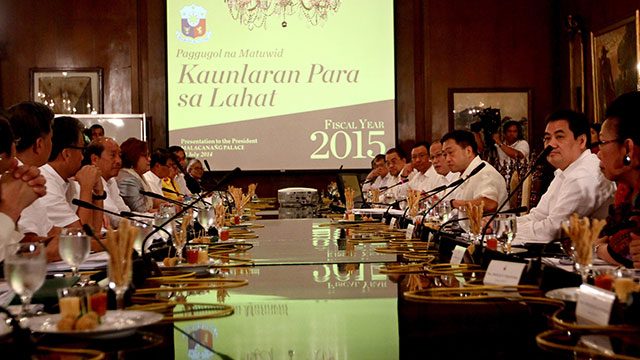SUMMARY
This is AI generated summarization, which may have errors. For context, always refer to the full article.
 In last year’s State of the Nation Address (SONA), President Benigno Aquino III used a catchphrase to describe his administration’s economic aim: inclusive growth.
In last year’s State of the Nation Address (SONA), President Benigno Aquino III used a catchphrase to describe his administration’s economic aim: inclusive growth.
Powerful, succinct, and measurable – both quantitatively and qualitatively – it quickly became a buzzword.
While current indicators suggest inclusive growth is yet to be attained – and this is perhaps why Aquino’s economic managers have stopped harping on the term – the catchphrase still inspires. One wishes however, that the buzz rubbed on the administration’s political discourse too.
But Mr Aquino’s refusal to accept the resignation of beleaguered Budget Secretary Florencio Abad underscores that while incremental progress is being made on the economic front, the opposite is actually happening on the political front.
It seems that for the Aquino administration and its allies, politicians and individuals worthy of walking the Straight Path (Daang Matuwid) of good governance are scarce. And the rare ones who were condescending enough to dip their hands in the mud of Philippine politics deserve all the power and the benefit of the doubt that they will use that power responsibly to make needed changes. All in good faith.
Interpersonal, not institutional
Interestingly, this ennobled political class and those who echo their views in public discussions trace interconnecting lineages.
Many of them are activists (or sons and daughters of activists) who fought the dictatorship of Ferdinand Marcos. A number are former officials during the first Aquino administration. While a handful are grassroots community organizers or academics-turned-policy-advisers. Tailing their coats are newly recruited young elite university graduates with a snooty, even sanctimonious air derisive of realpolitik. They belong to what can be called “the new but not-really-new-blood” in Philippine politics.
By exporting to the bureaucracy a shared organizational culture and a shared interpretive template of the world, they undoubtedly provide an otherwise disjointed government with some sense of corporate coherence. Personally forged commitments to certain norms and ideals facilitate and enhance trust not only between officials themselves, but also between government and the chattering civil society.
This is a double-edged sword, however.
On the one hand, it makes governing easier. But on the other hand, it reproduces the persistent inability to disassociate “person” from “office” that has long plagued Philippine politics and government.
This explains why many who were expected to challenge the administration’s anomalous budget allocations were initially muted or at least cautious in their critique. For them, the ability or mere intention of certain personalities to engage in corruption seems unthinkable. Well, at least, based on their intimate knowledge and encounter.

If in the case of corrupt officials, office is used to perpetuate personal interests, in the case of supposedly good-natured Aquino officials who had to be given all the benefit of the doubt, one’s personal character is assumed sufficient a testimony to how one makes political decisions.
Moralists and ethicists may argue that they imply each other.
But politics raises peculiar concerns. And these are bound to transform a person in ways unexpected and unpredictable. While many interpret Lord Acton’s warning “power corrupts, and absolute power corrupts absolutely” in figurative and prospective terms, there is wisdom too in thinking that he meant it quite literally.
One is literally corrupted when one holds power because one’s person evaporates in the very assumption of an office of power.
Reform by exclusion
This is where the Aquino administration’s philosophy of exclusively empowering and believing in the goodness of a select few individuals who were socialized by shared historical and institutional circumstances lends to practices of political exclusion and majoritarianism.
In divided societies, majoritarian impulses create problems in governability by concentrating access and distribution of resources – both material and symbolic ones. Instead of governing, political elites spend their time in office trying to ensure that their enemies lose in the next round of elections.
Solemnly convinced that all others are up to no good, Aquino’s political wizards have sent this empowered political class stomping through the halls of government offices on a political witch hunt. Rather than reach out, this empowered political class has instead moved toward a breach of constitutional boundaries.
It is easy to say that the ones excluded deserve to suffer their fates: a movie star from a warlord family that has long monopolized power in Cavite Province, the son of a former president who was convicted of plunder, and a nonagenarian hero of the 1986 EDSA revolution turned coup plotter turned lord of Senate Christmas gifts – Senators Ramon Revilla Jr, Jinggoy Estrada, and Juan Ponce Enrile are not difficult to loathe.
But in an electoral democracy like the Philippines, the battleground should not be in the allocation and distribution of resources but in the competition for the people’s votes.
Exclusive is not sustainable
Here lies the rub. The Liberal Party bloc in the factionalized administration coalition is nervous that the group of Vice President Jejomar Binay (who in a bizarre way, leads his own faction within the administration bloc) will be a formidable team to beat in the 2016 national elections.
Veep Binay’s likely challenger, Liberal Party leader Manuel “Mar” Roxas remains unappealing to voters. And despite being appointed to the interior and local government department to consolidate support from mayors and local officials, stiff, “conyo” (in popular parlance, a pejorative term for the rich or Spanish-mestizo or elite class) and ill-tempered Roxas is no contest at all for the hugely popular Binay.
Anecdotes that those anointed to Aquino’s reformist clique in the bureaucracy plan to resign when Binay wins in 2016 drive home the point: the exclusive club is not sustainable. These anecdotes also reveal the fiber that holds this group together. Not ideology. Not policy. But the comforting thought that one is slaving off in government for people within one’s comfort zones.
That Aquino’s supposed reformist achievements have not translated into electoral viability creates in the mind of those who advocate these reforms problems of continuity and sustainability. Unable to convince voters (at least for now) that the same political bloc should win in 2016 for reforms to continue, Aquino’s political operators had to circumvent constitutional limits to deliver, well, admittedly, lofty and noble goods.
Accommodation is key
The parallelism drawn at the start of the Aquino presidency between the new administration’s officials and college student councils lends a rather different impression this time. It’s not so much that Aquino’s reformists are engaged in some form of experimentalism – this in fact, is an accomplishment if alternative paradigms of democracy are to be believed.
It is rather, that they are insecure and unsociable in an out-of-place kind of a way.
Had Aquino and his EDSA 1986 cohort been more accommodating to political forces and groups outside their comfort zones, the administration would have avoided the constitutional debacle it currently faces.
Inclusive and accommodating political institutions that creatively circumvent the inherent “winner-take-all” feature of the presidential form of government should be the answer to the question of whether transactional practices are needed to attain transformational politics. – Rappler.com
RR Rañeses is an Instructor at the Department of Political Science, Ateneo de Manila University. On academic leave this semester, he is presently a Senior Research Analyst for an Asia-wide business intelligence and risk reduction company. He blogs at http://rrraneses.wordpress.com
Add a comment
How does this make you feel?
There are no comments yet. Add your comment to start the conversation.